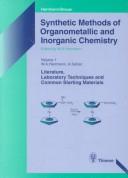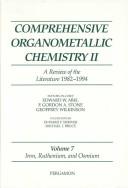Chemistry: Reactions & Syntheses
Synthetic Methods (Print Books)
-
Encyclopedia of Reagents for Organic Synthesis by Leo A. Paquette (Ed.)
Call Number: QD77 .E53 1995 [Science Reference] 8vols.ISBN: 0470017546 -
Comprehensive Organic Synthesis by Barry M. Trost and Ian Fleming
Call Number: QD262 .C54 1991 [Science Reference] 9vols.ISBN: 0080359299Major reference work covering organic synthesis in organic chemistry.
Also available online (see other column). -
Comprehensive Organic Name Reactions and Reagents
Call Number: QD77 .W36 2009 [Science Reference] 3vols.ISBN: 9780471704508 -
Theilheimer's Synthetic Methods of Organic Chemistry
Call Number: QD262 .S98 [Science Lower Level] Semiannual book series.ISBN: 3805596782 -
Comprehensive Coordination Chemistry III by Edwin Constable (Editor-In-Chief); Gerard Parkin (Editor-In-Chief); Lawrence Que (Editor-In-Chief)
Call Number: ebookISBN: 9780081026892Publication Date: 2021 -
 Comprehensive coordination chemistry : the synthesis, reactions, properties, & applications of coordination compounds
Call Number: QD474 .C65 1987 [Science Reference] 7vols.ISBN: 0080262325
Comprehensive coordination chemistry : the synthesis, reactions, properties, & applications of coordination compounds
Call Number: QD474 .C65 1987 [Science Reference] 7vols.ISBN: 0080262325 -
Comprehensive coordination chemistry II : from biology to nanotechnology
Call Number: QD474 .C65 2004 [Science Reference] 10vols.ISBN: 0080437486 -
 Synthetic Methods of Organometallic and Inorganic Chemistry
by
W. A. Herrmann (Ed.)
Call Number: QD411 .S964 1996 [Science Reference] 10vols.
Synthetic Methods of Organometallic and Inorganic Chemistry
by
W. A. Herrmann (Ed.)
Call Number: QD411 .S964 1996 [Science Reference] 10vols. -
-
 Inorganic Reactions and Methods
by
J.J. Zuckerman
Call Number: QD501 .I.54 1986 [Science Lower Level] 18vols.
Inorganic Reactions and Methods
by
J.J. Zuckerman
Call Number: QD501 .I.54 1986 [Science Lower Level] 18vols. -
 Comprehensive organometallic chemistry : the synthesis, reactions, and structures of organometallic compounds
Call Number: QD411 .C684 1982 [Science Reference] 9vols.
Comprehensive organometallic chemistry : the synthesis, reactions, and structures of organometallic compounds
Call Number: QD411 .C684 1982 [Science Reference] 9vols. -
 Comprehensive organometallic chemistry II
Call Number: QD411 .C652 1995 [Science Reference] 11vols.
Comprehensive organometallic chemistry II
Call Number: QD411 .C652 1995 [Science Reference] 11vols.
Reaction Databases and Synthetic Methods (Online)

-
ReaxysA search and retrieval system for chemical compounds, bibliographic data and chemical reactions. Based on data from Elsevier's chemistry databases (CrossFire Beilstein, CrossFire Gmelin and Patent Chemistry Database) merged together to provide harmonized content, it indexes core chemistry journals covering organic, metalloroganic, and inorganic chemistry, as well as organic patent publications.Access is restricted to current students, faculty, and staff of the University of Saskatchewan, and walk-in users, for educational, research, and non-commercial personal use. Systematic copying or downloading of electronic resource content is not permitted by Canadian and international copyright law.
-
ChemSpider SyntheticPagesPublishes practical and reliable organic, organometallic and inorganic chemical synthesis, reactions and procedures deposited by synthetic chemists.ChemSpider SyntheticPages is a freely available interactive database of synthetic chemistry. We publish practical and reliable organic, organometallic and inorganic chemical synthesis, reactions and procedures deposited by synthetic chemists. Synthetic methods on the site are updated continuously by chemists working in academic and industrial research laboratories.
-
Organic SynthesesProvides detailed, reliable, and carefully checked procedures for the synthesis of organic compounds.Some procedures describe practical methods for the preparation of specific compounds of interest, while other procedures illustrate important synthetic methods with general utility. Each procedure is written in considerably more detail as compared to typical experimental procedures in other journals, and each reaction and all characterization data has been carefully "checked" for reproducibility in the laboratory of a member of the Board of Editors.
-
Fieser and Fieser's Reagents for Organic SynthesisThe online version of the currently (in 2011) 23 print volume series including an A to Z listing of all reagents cited in synthetic literature with concise descriptions and illustrations of chemical reactions.The reagents are taken up in alphabetical order (common usage names, not CAS indexing code names), sometimes several to a page, sometimes several pages to a reagent. One can expect to find how to make the reagent (in loose terms), or where it can be bought, what it is good for, and where to seek complete details. The online version includes all "information about a particular reagent is collected in one single article. Thousands of entries abstract the most important information on commonly used and new reagents, including preparation, uses, sources of supply, critical comments, references and more.
-
Comprehensive Organic SynthesisMajor reference work covering organic synthesis in organic chemistry.Also available in print in the Science Library Reference: QD262 .C54 1991
University of Saskatchewan
The University of Saskatchewan's main campus is situated on Treaty 6 Territory and the Homeland of the Métis.
© University of Saskatchewan
Disclaimer|Privacy
- Last Updated: Oct 31, 2025 4:21 PM
- URL: https://libguides.usask.ca/chemistry
- Print Page